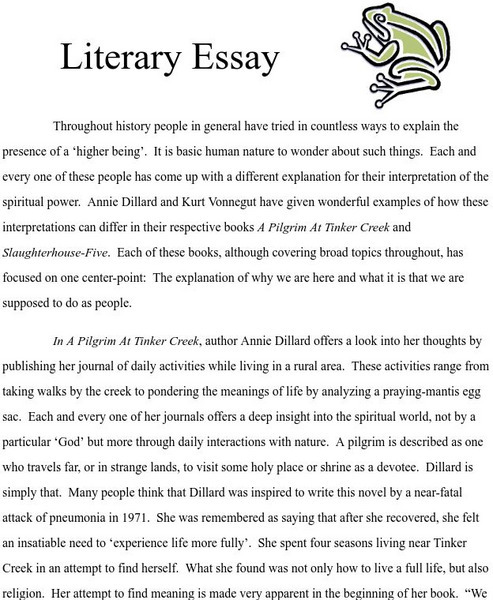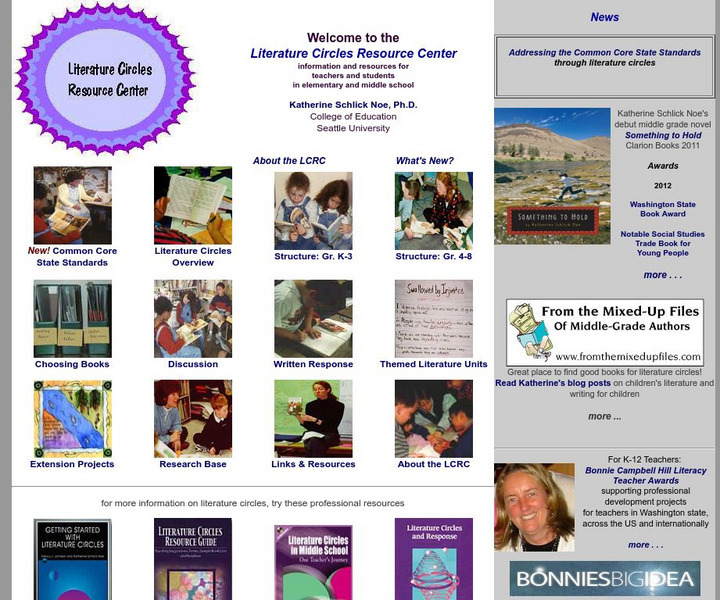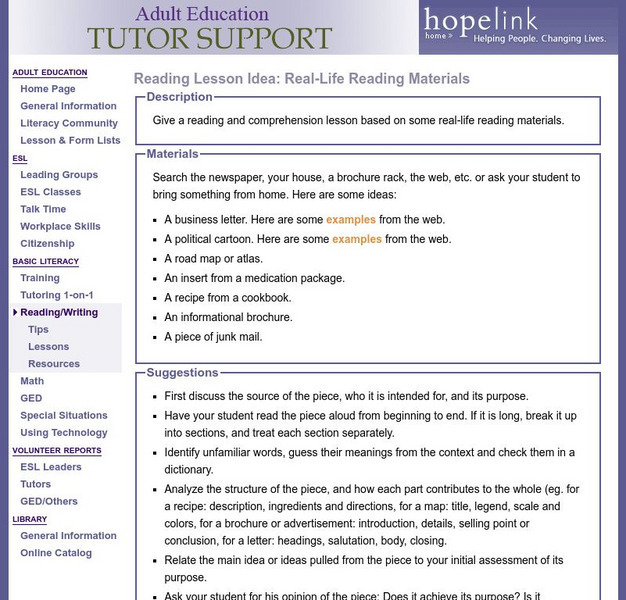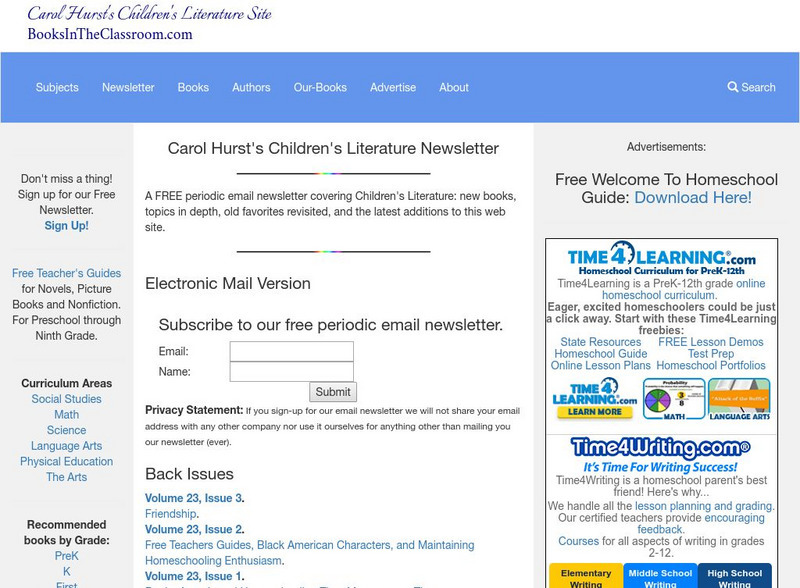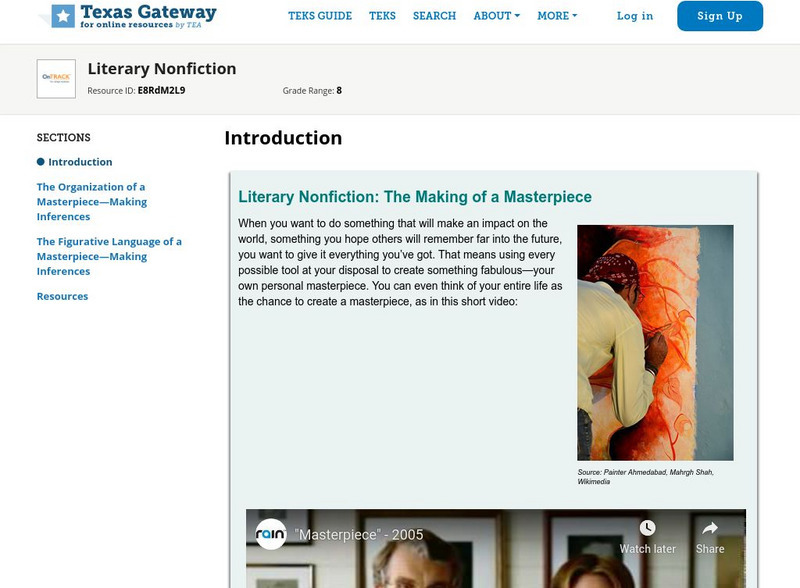Other
Clemson University: Literary Essay
Literary essay example by a student discussing two works by Annie Dillard and Kurt Vonnegut, Jr. A good example of a strong literary essay.
University of Victoria (Canada)
The U Vic Writer's Guide: Literary Term: Novel
This site provides a general overview of the novel, including its history and generic forms. Includes a few examples and related links.
Other
Bedford/st. Martin's: Lit Gloss
An encyclopedia of literary terms is included on this site. Students can choose different letters of the alphabet to search for literary terms.
Other
Concepts and Practices for Writing Courses: Interpreting Literature
This tutorial surveys the way readers should interpret literature or text in symbols, syntax, meaning, and the like. The article features a Literary Toolkit for Analyzing Literature.
Other
Georgia Perimeter College: Learning and Tutoring Center: Communications Handouts
This index provides links to educational resources on various English topics. Some topics included are related to punctuation, parts of speech, usage, different types of writing, and analytical questions for various genres of literature.
Other
Seattle University: Literature Circles Resource Center
How can you get started with literature circles in your classroom? This site provides information on every aspect of developing your own literature circle instruction.
Hopelink
Hopelink: Reading Lesson Idea: Real Life Reading Materials
The purpose of this reading instructional activity is to offer a reading and comprehension instructional activity based on real-life reading materials. This gives students the opportunity to gain reading comprehension skills from...
TES Global
Blendspace: Literary Terms Resources
This Blendspace provides assorted references for literary terms and brief literary terms assessments. This blendspace is designed to support all secondary students, including those who will be taking AP literature courses.
TES Global
Tes: Analyzing & Comparing Non Fiction
[Free Registration/Login Required] Resource notes to aid students as they analyze different types of nonfiction. The GAP (genre, audience, and purpose) acronym is provided to use when comparing nonfiction texts.
Other
Biographical Dictionary
Students are able to connect to a search engine containing a dictionary that "covers more than 28,000 notable men and women who have shaped our world from ancient times to present day."
Read Works
Read Works: Finding Salinger
[Free Registration/Login Required] This passage shares the story of a lost cat. This passage is a stand-alone curricular piece that reinforces essential reading skills and strategies and establishes scaffolding for vocabulary learning....
Read Works
Read Works: An Unexpected Trip
[Free Registration/Login Required] This fiction passage requires to reader to solve a mystery at then end. This passage is a stand-alone curricular piece that reinforces essential reading skills and strategies and establishes scaffolding...
Read Works
Read Works: Time for Jazz
[Free Registration/Login Required] A literary text about a girl named Lina who wanted to learn more about jazz music and its history. A question sheet is available to help students build skills in reading comprehension.
Books in the Classroom
Carol Hurst's Children's Literature Site: Children's Literature Newsletter
Free monthly email newsletters featuring classic children's literature, new books, ideas and activities to use with students, and links to other Internet resources.
AdLit
Ad lit.org: What's the Big Idea? Integrating Young Adult Literature
Drawing on New York City teachers' experiences, this article examines three ways to effectively integrate young adult literature into the curriculum: use core texts (usually novels, but also other genres as well) that the entire class...
E Reading Worksheets
E Reading Worksheets: Nonfiction Passages and Functional Texts Worksheets
In this learning module, students will practice reading nonfiction passages. Students will also have the opportunity to answer multiple choice comprehension questions, answer short and extended response questions, and take a test. This...
ReadWriteThink
Read Write Think: Motivating Students to Read Nonfiction
This lesson plan deals with timelines in connection to nonfiction reading. Included in the lesson plan is an overview, practice, objectives, resources, preparation, and more.
Texas Education Agency
Texas Gateway: Literary Nonfiction
Analyze literary nonfiction, particularly speeches, by making inferences and drawing conclusions based on evidence in the text.
Texas Education Agency
Texas Gateway: Analyze Point of View in Literary Texts/fiction
Identify and understand an author's choice of point of view, including limited versus omniscient and subjective versus objective.
Texas Education Agency
Texas Gateway: Analyze the Central Characters in Literary Text/fiction
Learn how the central characters' qualities influence theme and resolution of the central conflict.
Texas Education Agency
Texas Gateway: Compare/contrast Themes and Genres in Literary Texts
You will learn how to analyze, make inferences, and draw conclusions about theme and genre in different cultural, historical, and contemporary contexts and provide evidence from the text to support your understanding.
Texas Education Agency
Texas Gateway: Literary Terminology: Practice 5 (English I Reading)
[Accessible by TX Educators. Free Registration/Login Required] You will practice using terminology critical for comprehension, interpretation, and analysis of poetry, drama, and fiction.
Texas Education Agency
Texas Gateway: Development of Characters Through Literary Devices
Rcognize how literary devices such as character foils can create complex characters in a short story.
Texas Education Agency
Texas Gateway: Literary Nonfiction
Learn how to analyze literary nonfiction, particularly speeches, by making inferences and drawing conclusions based on evidence in the text.


